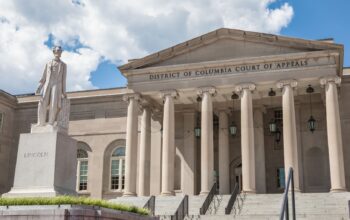Having eliminated diversity, equity and inclusion (DEI) efforts, attacked the teaching of Black history in schools, and embraced white nationalist rhetoric, President Donald Trump is promoting a return to America’s racist instincts.
On Sunday, the president posted a racially charged message on his Truth Social platform, demanding that Washington’s NFL team restore its previous name — a name long condemned as a slur against Indigenous people.
“The Washington ‘Whatever’s’ should IMMEDIATELY change their name back to the Washington Redskins Football Team,” the president wrote. “There is a big clamoring for this… Our great Indian people, in massive numbers, want this to happen… OWNERS, GET IT DONE!!!”
He later threatened to block funding for RFK Stadium if Washington does not change its current name.
“I may put a restriction on them that if they don’t change the name back to the original ‘Washington Redskins,’ and get rid of the ridiculous moniker, ‘Washington Commanders,’ I won’t make a deal for them to build a Stadium in Washington,” Trump wrote.
He also insisted that Major League Baseball’s Cleveland Guardians return to their former name, the Indians.
While sports executives have dismissed Trump’s remarks, his suggestions reignited a painful history and ongoing conversation about race, identity, and power — especially in the nation’s capital.
Josh Harris, who purchased the Washington Commanders in 2023 from disgraced former owner Dan Snyder, had previously shut down speculation about returning to the old name.
“The name was changed, and it’s not going back,” Harris said in an earlier statement, which appeared to make clear that the new ownership has no interest in revisiting a controversy that has long divided the city and caused deep harm.
The History Behind the Former Name, New Name
The controversy — centered in Washington — dates back to 1933, when the franchise changed its name from the Boston Braves to the Boston Redskins. The team relocated to Washington in 1937, where it remained known as the “Redskins” until 2020– when it was then called the Washington Football Team.
For decades, Indigenous leaders, civil rights advocates, and scholars condemned the name as a racial slur comparable to the most vile insults hurled at other marginalized groups.
In the early 1970s, the first significant public backlash against the name took hold, with Washington journalists and activists comparing the term “Redskins” to anti-Black slurs. The team president at the time claimed the name was meant to “convey reverence,” but the defense rang hollow for many in the Native American community.
By 1992, protests escalated.
At Super Bowl XXVI, played in Minnesota and featuring the Washington team, thousands demonstrated against the name. That same year, Suzan Shown Harjo, a prominent Native American rights advocate, led a legal challenge to revoke the team’s federal trademark protections. The courts initially ruled in her favor in 1999, declaring the name disparaging, but years of appeals followed.
Daniel Snyder, then-owner of the team, remained defiant. In 2013, he famously told USA Today, “We’ll never change the name. NEVER — you can use caps.”
That same year, President Barack Obama urged Snyder to reconsider.
“If I were the owner of the team and I knew that the name of my team… was offending a sizable group of people, I’d think about changing it,” Obama said.
Despite Snyder’s efforts to portray the name as honoring Native heritage — even citing alleged support from Indigenous leaders and organizations — key groups like the Red Cloud Indian School explicitly refuted any endorsement, calling the name offensive and harmful.
In Washington, the pressure mounted. Activists, corporate sponsors, and even the District’s local officials spoke out. The team ultimately retired the “Redskins” name in July 2020, after FedEx, Nike, and PepsiCo investors pushed for the change, citing reputational damage and social responsibility. FedEx, which held naming rights to the team’s stadium, was especially influential — its CEO, Fred Smith, was a part-owner.
For two seasons, the team played under the placeholder name “Washington Football Team” before unveiling “Commanders” in 2022.
“Trump demanded that the Washington Commanders change their names back to the Washington Redskins,” social media user Bryan Behar wrote on X, formerly known as Twitter. “Can you believe a president is putting his energy on this nonsense? And for no other reason that he wants to make the name MORE RACIST?
‘Words Matter. Names Matter. And We Won’t Go Back.’
Many say Trump’s call to return to the old name is not only an affront to those efforts but also an insult to the people of Washington, D.C., where residents — particularly Native and Black communities — have fought tirelessly for representation, dignity, and respect.
The Commanders are not just a football team. In the city where Congress meets, where civil rights battles have been waged for generations, and where racial justice remains a pressing concern, the team’s name has always carried weight beyond the gridiron.
Chris Antonetti, the Cleveland Guardians’ president of baseball operations, echoed Washington’s stance during a Sunday press briefing.
“We understand there are different perspectives… but obviously it’s a decision we made. We’ve had the opportunity to build a brand as the Guardians over the last four years and are excited about the future,” he said.
But the spotlight remains on Washington — and not just because it’s the seat of American power. It’s because the team’s identity was at the center of a decades-long fight against racism, bigotry, and historical erasure.
And now, Trump wants to drag it all back.
“It is long overdue that we stop treating people as mascots,” Harjo once said. “Words matter. Names matter. And we won’t go back.”
Source: Published without changes from Washington Informer Newspaper



